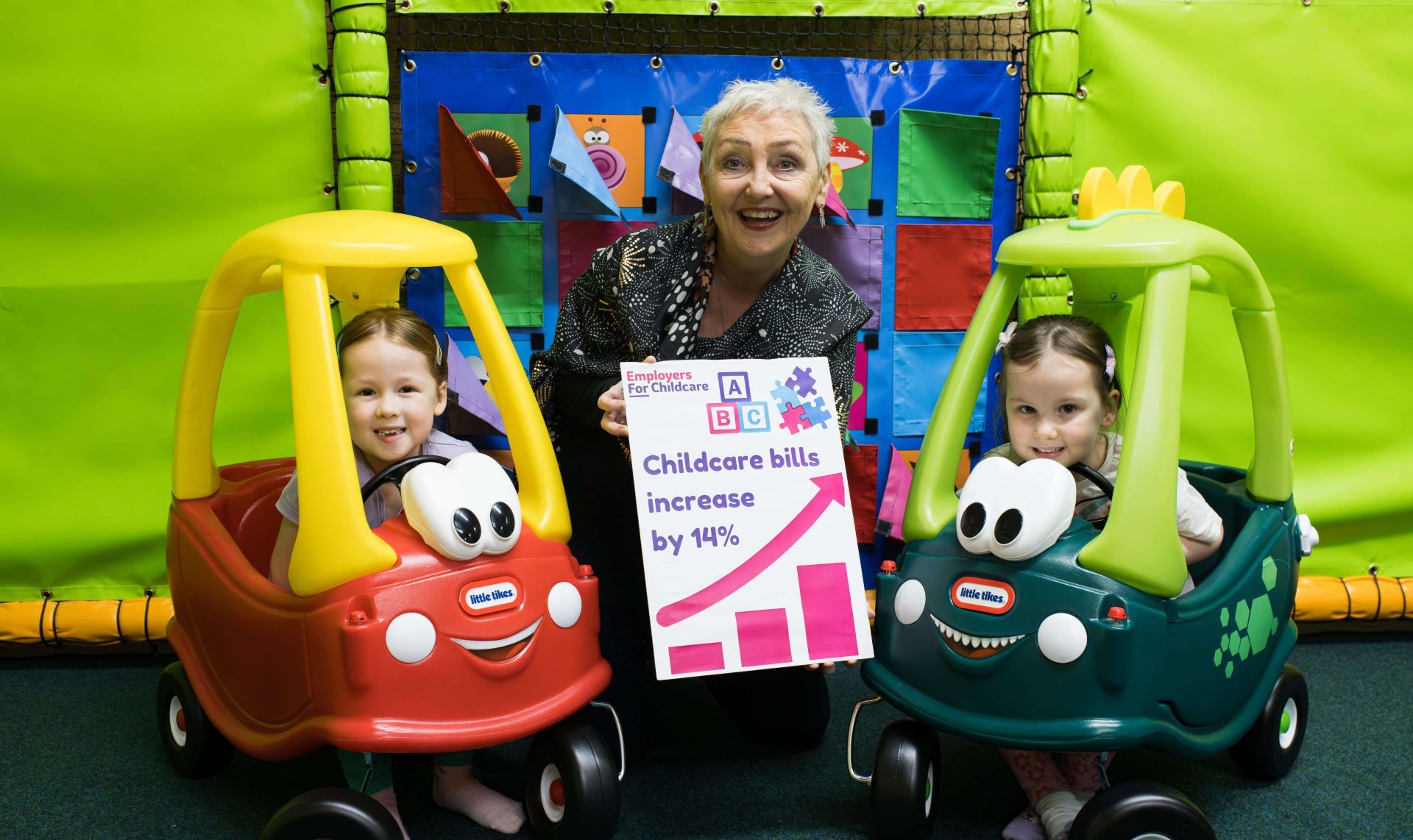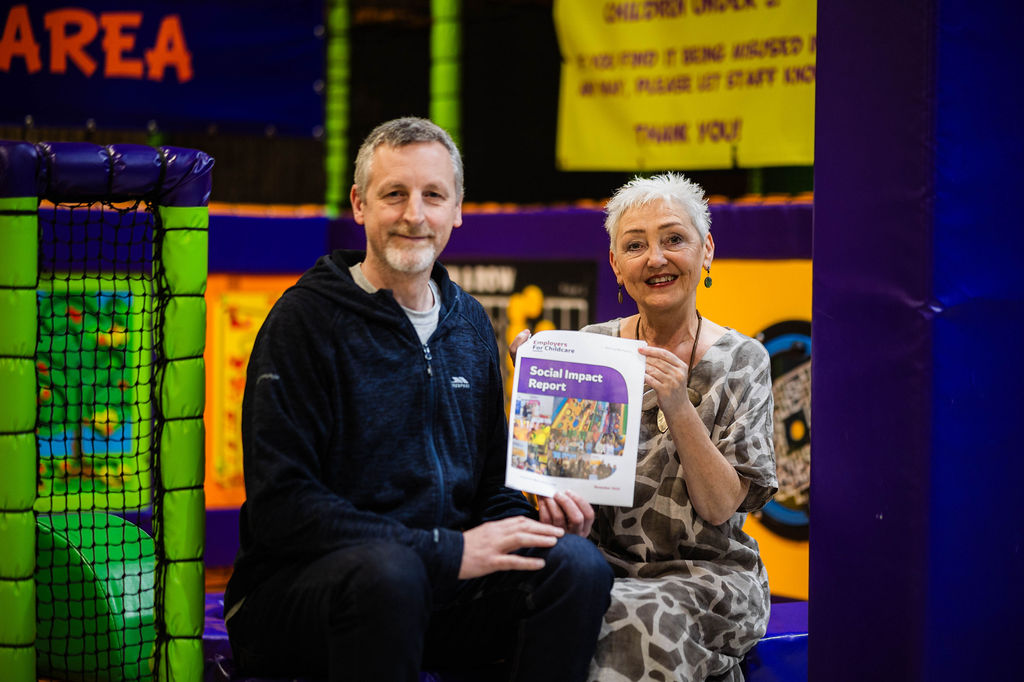Tackling disadvantage through childcare in Northern Ireland
Tackling disadvantage through childcare in NI
This new briefing by Employers For Childcare, in partnership with Joseph Rowntree Foundation (JRF), highlights that while quality, affordable early learning and childcare is key to lifting families out of poverty and giving children the best start in life, at present, the system in Northern Ireland is letting families down and not achieving its potential to tackle disadvantage.
The challenge for families and providers
The system in Northern Ireland has reached a breaking point, for parents and for early learning and childcare providers. Early learning and childcare is not affordable for families to access. The existing system of support is complex and, for many households, the unaffordability of childcare is leaving parents questioning whether they can afford to work – particularly when their children are very young.
For childcare providers, high staff turnover and recruitment and retention challenges across the sector impact financial sustainability and the quality of provision as it is increasingly difficult to secure and progress skilled staff. Low pay is a major problem across the sector.
There is no sufficiency duty requiring the government to ensure there are sufficient childcare places to appropriately meet the needs of all families, including those who have a child with a disability. Families in Northern Ireland can face a range of barriers to accessing quality early learning and childcare.
The multi-regulatory environment is complex, and it can be difficult to access multidisciplinary support where it is required.
It is lower-income families who are least likely to benefit from quality childcare, reducing household incomes as a result of parents working fewer hours or stopping work altogether. Disadvantaged children are therefore missing the benefits of quality provision.
Recommendations to tackle disadvantage through early learning and childcare
Affordable early learning and childcare is essential in making work a route out of poverty. With work ongoing on a new Early Learning and Childcare Strategy in Northern Ireland, there is a generationally significant opportunity to design and invest in a new model of integrated early education and childcare. Taking learning on board from the roll out of schemes elsewhere in the UK and Ireland, this briefing makes a number of recommendations to inform the new Strategy, aimed at tackling disadvantage through early learning and childcare:
- A bespoke funding model for the sector to better meet the needs of all families, incorporating:
- Universal, free provision of 22.5 hours of early learning and childcare for children in their immediate pre-school year.
- A core-funding subsidy for all registered childcare providers covering a portion of their costs of delivering quality early education and childcare, enabling them to reduce the fees they charge parents. The subsidy should be increased over time, as public finances allow, further reducing fees for parents.
- A strengthening of the support aimed specifically at tackling disadvantage, including targeted subsidies for providers and expansion of Sure Start services.
- New legislation to establish a statutory basis for the financing, supervision and coordination of the delivery of early learning and childcare services, together with a clear sufficiency duty.
- A Workforce Strategy for the sector informed through a meaningful review of childcare regulations and standards.
These are an initial suite of measures to be taken in the first half of a new 10-year Early Learning and Childcare Strategy. They are aimed at addressing the issues set out above without destabilising the sector or introducing unintended consequences that could work against the objective of tackling disadvantage.
For the second half of the new strategy, there will then be a much stronger foundation on which to build a more responsive co-funding model for early learning and childcare, taking account of household income to determine what families pay on the basis of what is affordable to them.
Aoife Hamilton, Employers For Childcare, said: “Quality, affordable early education and childcare is a key tool in tackling disadvantage by enabling parents to work and helping to give all children and young people the best start in life. However, inadequate investment, and a lack of progress over many years, means that the system in Northern Ireland is failing parents, providers and children – and entrenching disadvantage. This cannot continue, and a new Executive must address this issue as a day one priority identifying the ambitious funding that is needed to deliver a world-leading early learning and childcare infrastructure.
The recommendations in this briefing are designed to inform ongoing work to develop options for the new Early Learning and Childcare Strategy. While further work is needed to develop the proposals, they offer a starting point from which to work collaboratively across the sector to co-design an early learning and childcare system that achieves its greatest potential for families, our economy and wider society.”
Louise Woodruff, JRF, said: “A well designed and functioning childcare system can be a key tool to tackling disadvantage. It can prevent disadvantaged children falling behind before they even start school and help address child poverty by supporting parents to work. Families deserve childcare that’s high quality, affordable and easy to access. A childcare system that works doesn’t just help parents, it improves our economy, our communities and our society. This new report looks at the policy change needed in Northern Ireland to deliver on this ambition.”
Acknowledgements
We are grateful for support from colleagues within PlayBoard NI, the Northern Ireland Childminding Association, Save the Children NI, Stranmillis University College, the Community Daycare Network and an Early Years social worker in a Health and Social Care Trust (HSCT) who took the time to discuss the issues raised within the briefing. These were advisory discussions only and the briefing is not an agreed statement of views.






